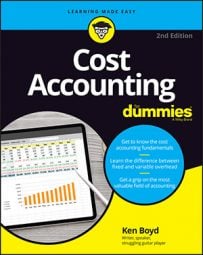In cost accounting, stockout costs represent what you lose when an item is out of stock. You need to consider both the short-term and the long-term impacts of a stockout. Assume someone sees a black-and-orange scarf on your shop’s website. When he or she stops by the store, that scarf is out of stock.
Consider the impact on your business. Maybe you get lucky, and the customer is willing to wait a little for the item. You still get the sale, but you may incur a higher cost for the inventory item because you’re placing a small order at the last minute.
The purchasing cost might be higher, and you might incur a cost to get the item shipped overnight. So you “saved the sale” but certainly have a lower level of profit.
The lower level of profit in this case means a lower contribution margin (sales less variable costs) for one scarf. For stockout costs, focus on direct costs. You don’t consider fixed costs like the lease payment on your building, or indirect costs, like utility costs for the shop. Bear in mind that if you lose sales, you have to spread your costs over fewer units sold. That increases your cost per unit.
You have two types of opportunity costs if an item is out of stock. First, there’s reduced contribution margin if you fill the order. But there’s lost contribution margin if you lose the sale.
You also risk lost contribution margin on future orders. Because the item wasn’t in stock, maybe the customer decides to do future business somewhere else. That’s why for many stores, customer loyalty is important — the customer will stick with you. It also explains why on the Internet, when a sale is lost, the customer is at another website in an instant.
Bear in mind that opportunity costs aren’t posted to your financial statements. That’s because the dollar amount of the impact is hard to quantify. You can’t put a dollar amount on the amount of business you lose due to items that are out of stock. (However, those losses may trouble you when you go home at night.)

